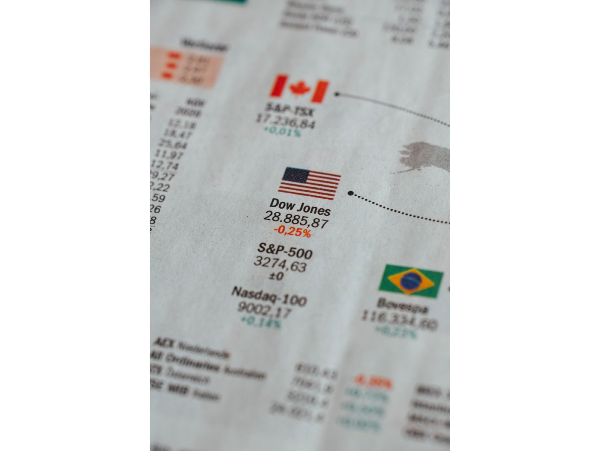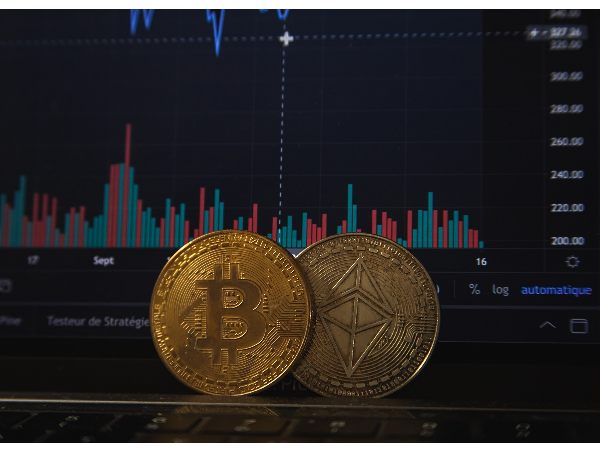Over the past decade, the term crypto has become common lingo when talking about wealth and investments. When someone says that bought Bitcoin, the most popular and widely-discussed cryptocurrency, what does that mean? Beginning investors may feel some confusion about the difference between shares of stock and units of cryptocurrency, commonly known as "crypto." After all, both can be purchased easily on investing apps like Robinhood.
With crypto in the news this week due to a meltdown in prices, newbie investors may wonder if the same rules about buying when prices are down applies equally to crypto and stocks. Are they basically the same? The popularity of hyping crypto on social media, especially with the sudden success of Dogecoin last spring, may lure in investors who haven't done their research.
Stocks

First of all, stocks and crypto are not the same. Stocks are units of ownership in a corporation, while crypto is a digital currency that was originally created as a solution to problems like inflation, counterfeiting, and theft. However, it is important to note that crypto is not a legal tender currency like the U.S. dollar. It is a commodity like gold or silver. While gold, silver, and cryptocurrencies may look like money, sellers do not have to accept them the way they do fiat currency (whatever a nation declares as its money).
A stock's value is affected by the profitability or expected profitability of the corporation. For most large corporations, like those on the Dow Jones Industrial Average (DJIA), this is relatively stable. Analysts can use both macroeconomic data (trends for inflation, unemployment, etc.) and reports released quarterly and annually by publicly-traded corporations, such as the annual 10-K or quarterly 10-Q report to estimate corporations' profitability and future growth.
If a corporation is productive and innovative, or the economy is enjoying broad-based growth, its stock price will rise as people purchase the stock, assuming the corporation's profits will increase. Therefore, stocks can be affected by the efforts of a corporation and its leaders. Stock prices tend to mirror the broad economy, with stock prices rising during economic booms and falling somewhat during recessions.
Crypto

Cryptocurrency, as a commodity, is not linked to any corporation. A second difference is that, because the supply of most cryptocurrency is limited, its value is almost entirely based on investor demand. This can make the value of a cryptocurrency very volatile, as there is no "anchor" of revenue-generating goods or services to maintain a base level of value. For example, General Motors (GM) is unlikely to be extremely volatile as a stock because it sells thousands of vehicles per year, even during recessions.
Opposite of stocks, crypto tends to be seen as a hedge. A hedge is an investment that increases in value when most other investments decrease in value. During times of inflation, many investors buy gold and other precious metals because their limited supply makes them attractive. Similarly, the limited supply of cryptocurrencies make them popular hedges. When stocks crash during a recession, commodities (including crypto) and real estate are popular investments.
Beginning investors should know these basic differences between stocks and crypto. To sum it up, blue chip stocks like those found on major indexes (DJIA, S&P 500) tend to be much less volatile than crypto, and see value rise and fall similar to the broad economy. Crypto is a commodity - not actual currency - and is seen as a hedge investment that can protect wealth during turbulent economic times.
However, there is one warning regarding cryptocurrency and its success as a hedge: Crypto began in 2009, only after the Great Recession hit. Thus, it is unknown how effective of a recessionary hedge cryptocurrencies will be. This should be a warning sign to beginning investors. Unless you have enough money to invest in start-ups and IPOs, it may be a good idea to avoid cryptocurrency until it shows that it can weather a recession.
















Over the past decade, the term crypto has become common lingo when talking about wealth and investments. When someone says that bought Bitcoin, the most popular and widely-discussed cryptocurrency, what does that mean? Beginning investors may feel some confusion about the difference between shares of stock and units of cryptocurrency, commonly known as "crypto." After all, both can be purchased easily on investing apps like Robinhood.
With crypto in the news this week due to a meltdown in prices, newbie investors may wonder if the same rules about buying when prices are down applies equally to crypto and stocks. Are they basically the same? The popularity of hyping crypto on social media, especially with the sudden success of Dogecoin last spring, may lure in investors who haven't done their research.
Stocks
First of all, stocks and crypto are not the same. Stocks are units of ownership in a corporation, while crypto is a digital currency that was originally created as a solution to problems like inflation, counterfeiting, and theft. However, it is important to note that crypto is not a legal tender currency like the U.S. dollar. It is a commodity like gold or silver. While gold, silver, and cryptocurrencies may look like money, sellers do not have to accept them the way they do fiat currency (whatever a nation declares as its money).
A stock's value is affected by the profitability or expected profitability of the corporation. For most large corporations, like those on the Dow Jones Industrial Average (DJIA), this is relatively stable. Analysts can use both macroeconomic data (trends for inflation, unemployment, etc.) and reports released quarterly and annually by publicly-traded corporations, such as the annual 10-K or quarterly 10-Q report to estimate corporations' profitability and future growth.
If a corporation is productive and innovative, or the economy is enjoying broad-based growth, its stock price will rise as people purchase the stock, assuming the corporation's profits will increase. Therefore, stocks can be affected by the efforts of a corporation and its leaders. Stock prices tend to mirror the broad economy, with stock prices rising during economic booms and falling somewhat during recessions.
Crypto
Cryptocurrency, as a commodity, is not linked to any corporation. A second difference is that, because the supply of most cryptocurrency is limited, its value is almost entirely based on investor demand. This can make the value of a cryptocurrency very volatile, as there is no "anchor" of revenue-generating goods or services to maintain a base level of value. For example, General Motors (GM) is unlikely to be extremely volatile as a stock because it sells thousands of vehicles per year, even during recessions.
Opposite of stocks, crypto tends to be seen as a hedge. A hedge is an investment that increases in value when most other investments decrease in value. During times of inflation, many investors buy gold and other precious metals because their limited supply makes them attractive. Similarly, the limited supply of cryptocurrencies make them popular hedges. When stocks crash during a recession, commodities (including crypto) and real estate are popular investments.
Beginning investors should know these basic differences between stocks and crypto. To sum it up, blue chip stocks like those found on major indexes (DJIA, S&P 500) tend to be much less volatile than crypto, and see value rise and fall similar to the broad economy. Crypto is a commodity - not actual currency - and is seen as a hedge investment that can protect wealth during turbulent economic times.
However, there is one warning regarding cryptocurrency and its success as a hedge: Crypto began in 2009, only after the Great Recession hit. Thus, it is unknown how effective of a recessionary hedge cryptocurrencies will be. This should be a warning sign to beginning investors. Unless you have enough money to invest in start-ups and IPOs, it may be a good idea to avoid cryptocurrency until it shows that it can weather a recession.